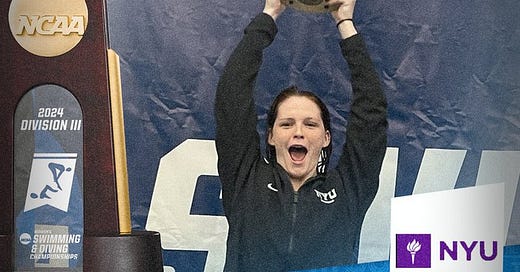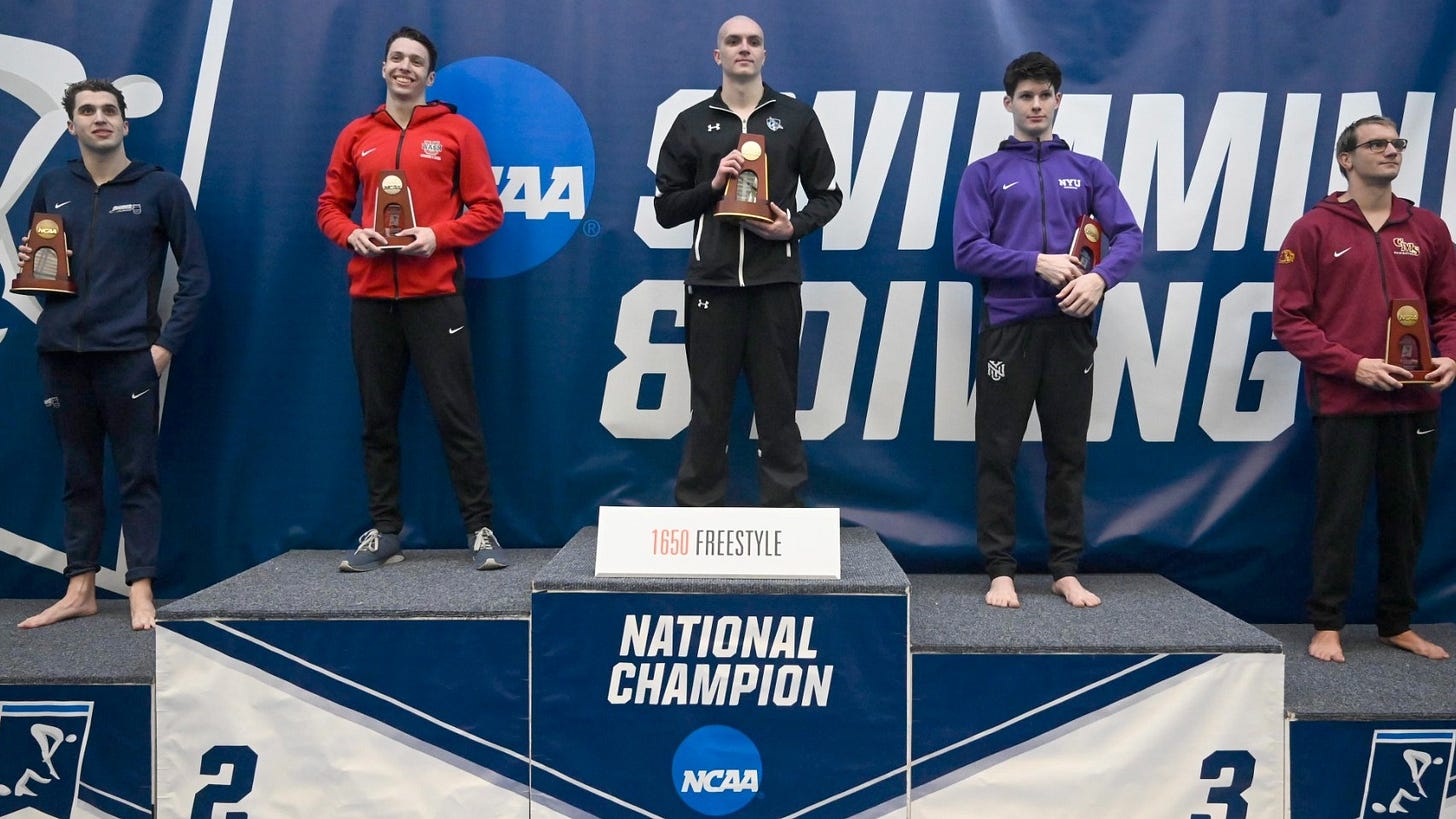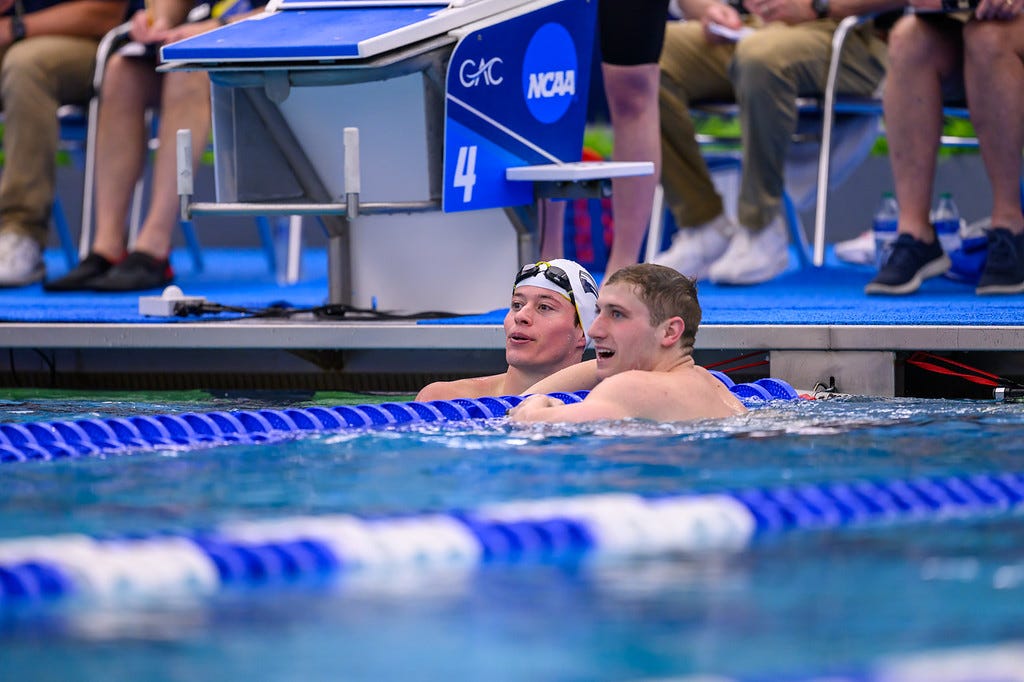200 Butterfly
Women
Beyond what we see on deck, it is hard to get a sense of an athlete’s personality, but, man, Caitlin Marshall sure seems affable. For the second time in three years she won 200 Butterfly, this time in 1:58.50, which…that’s fast.
Note to athletes: Post-event interview ‘thought I was gonna puke’ jokes always go over big with the crowd. It’s an evergreen.
Alesha Kelly, last year’s event winner, went under 2:00 to grab second place. Emily Harris of Denison and Sophia Schmitz of Kenyon kept the horse-race drama alive, and Kenyon’s Jordan Herrera (who seems to final in every event she swims) contributed an assist from the B Final.
But the action here was all NYU. Four NYU swimmers in the A final: Ms. Marshall, Nicole Ranile, Reina Gomez, and Youngju Baik. NYU pulled 60 points from this event.
Men
Apparently, it is extraordinarily difficult - borderline not-doable - to win any Men’s event at Nationals three years in a row.1 Frank Applebaum was not having a down year. He reset the national record in 200 Fly, his signature event, in December of this season. He just swam a 1:43.39 which would have been a new national record.
And Justin Finkel still beat him. 1:43.21. Unreal.
Digression on the CSCAA Swimmer of the Year Award and Kellen Roddy
Given the fates that befell the other elite athletes trying for three in a row - Frank Applebaum and Garrett Clasen (200 IM) - if Kellen Roddy wins the mile does that make him a plausible candidate for Swimmer of the Year?
That award is about what swimmers do at Nationals. It usually goes to the person who ignites the biggest fireworks - breaks records, or wins some IMs (which, perhaps show range, but also have the most back and forth action). But why not, one year, just reward consistent excellence? It seems every post-event interview is about consistency, showing-up every time, always being ready to go… those are the values, right? If Mr. Roddy wins the mile today, why not put our money where our mouth is, and actually reward consistency and winning year after year, especially in a year in which we have been repeatedly reminded of how unlikely it is for anyone to ever get three in a row?
100 Back
Women
We have a very bad habit of making predictions. As with most bad habits, we bemoan the habit but have no real intention of stopping. One prediction we made was that Kate Augustyn would make a very strong case for Swimmer of the Year honors, and she’s kind of bailing us out. So, thank you Ms. Augustyn for that. In case you had not heard, Ms. Augustyn broke - twice in 24 hours with the exact same time, 53.41 - the 6th oldest record on the books, the 100 Back record previously held by Kenyon’s Celia Oberholzer, set on March 22, 2013.
Sophia Verkleeren was predictably excellent, coming in second. Sammi Thiele, from tiny Austin College, finished third, which suggests she is not just happy to be here.
This was also a nice horse-race event for Kenyon with Caleigh Wukitch and serial-overperformer Lisa Torrecillas-Jouault chipping in major points.
Men
Djordje Dragojlovich has some range. Last year, he won 100 Free. This year, 100 Back. It wasn’t that close, and he cruised ahead of an all-star heat (seriously, take a look, those are some of the best backstrokers of this generation).
Our earlier post covered the horse-race, so we can give it less attention here. Suffice to say this was a very good event for Kenyon - with Yurii Kosian taking the 5th spot - and it doesn’t matter anymore because it doesn’t look like anyone is catching Emory. Unless something crazy happens.
100 Breast
Women
Jennah Fadely won, going 59.80, just 0.03 off the record set by KT Kustritz in 2018. She is without equal in Division III in sprint breaststroke. Teammate Gabby Wei finished third, in another good horse-race event for the Kenyon ladies.
MIT’s breaststroke Jedi Edenna Chen finished second, winding down a long D3 career in which she was always, year after year, among the very best. Williams Senior Amanda Wager was just 0.06 behind Gabby Wei, and is also moving towards the end of a dominate collegiate career.
Men
Derek Maas pulled away from Jake Meyer on the last turn and won the event by 0.43 seconds. Garrett Clasen refused to be shaken-off and came in 0.13 seconds behind Mr. Meyer. It was a great race, one of the most compelling in a very compelling championship meet, with a very convincing last stretch by Mr. Maas. Ultimately, it was just a great race. The falcon heard the falconer. Andrew Wilson’s record of 50.94 held. Things did not fall apart.
If you guys are still thinking about the horse-race, yes, this was a big one for Emory. Mr. Meyer finished 2nd, Henri Bonnault finished 7th, and Liyang Sun took 11th.
1 mtr Diving
Guess who won. Yeh, Israel Zavaleta. Kenyon is really going to miss that guy. He’s money in the bank.
800 Free Relay
An observation on relays: they are all about downside potential.
First, they don’t make much difference, unless the team points totals are very close. In which case, anything would make a difference.
Relays are not game-changers because: if you win a relay, you took only one spot in the top eight, leaving 196 points to be distributed among the other seven teams. So even when you win, you only claim 17% of the points being contested (and you cannot have another entry from your team in that event).
When NYU got four athletes in the A Final they pulled 60 points total. In an individual event, if you place four athletes in the A Final, it’s very likely that you will claim 50% or more of all the points available in that event. It is not just that you can pile up 60 points. It is that you leave only 58 points for everyone else to fight over.
Generally, the only way that a relay really alters the course of a meet is when a contending team DQs, in which case you are screwed. (To get the proper effect, elongate the pronunciation of the word ‘screwed’ with extra emphasis on the ‘ooo’ sound.)
Women
Which is apropos of nothing, considering none of the contending teams got DQ’d.
Kenyon finished third, right behind Denison, yielding only two points to the Big Red in the event Denison won last year. Kaley McIntyre went 2-7 seconds faster than everyone else in the anchor leg, which, OK, we get it.
Men
Emory came in second, which is nice for them. Since they did not disqualify their relay nothing else about this event matters for their opponents. We think Pomona-Pitzer might have swum in the day-time slot where teams not expected to contend get pool time. The Sagehens made the most of it and wound up third so, great job out of them.
The last person to do it was Jason Hamilton, and we aren’t sure that counts because he won 200 Breast in 2019, then again in 2022, and 2023, and we aren’t sure what to make of that break when there was no nationals in 2020 and 2021. Is that like a hitting streak in baseball that continues from the end of the previous season? It is hard to know if it counts.








Caitlin Marshall is beyond affable she’s a star
Anytime your 1 - 2 - 3 finishers all have times in the top 5 of all time (100breast), it’s a great race. Such a solid group.